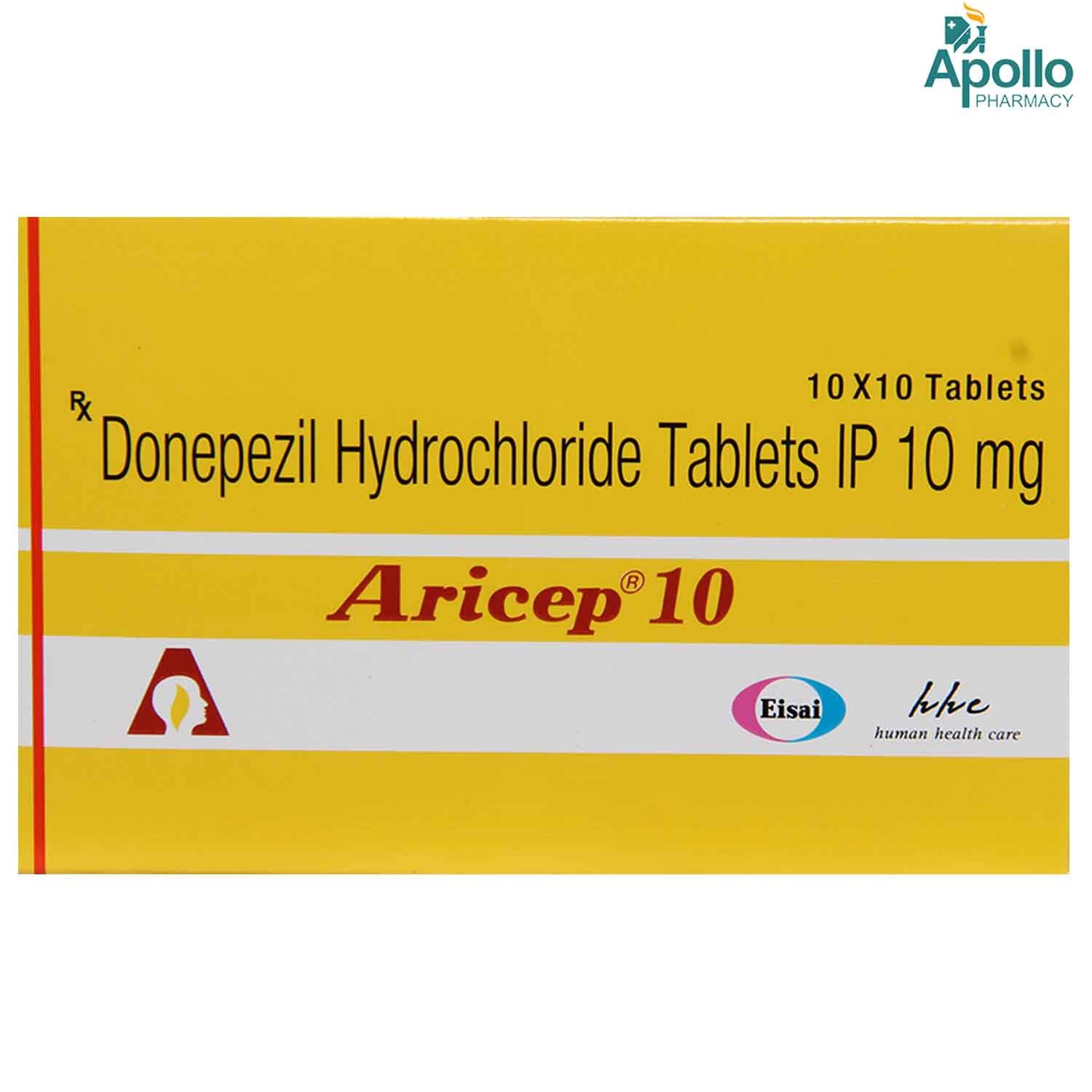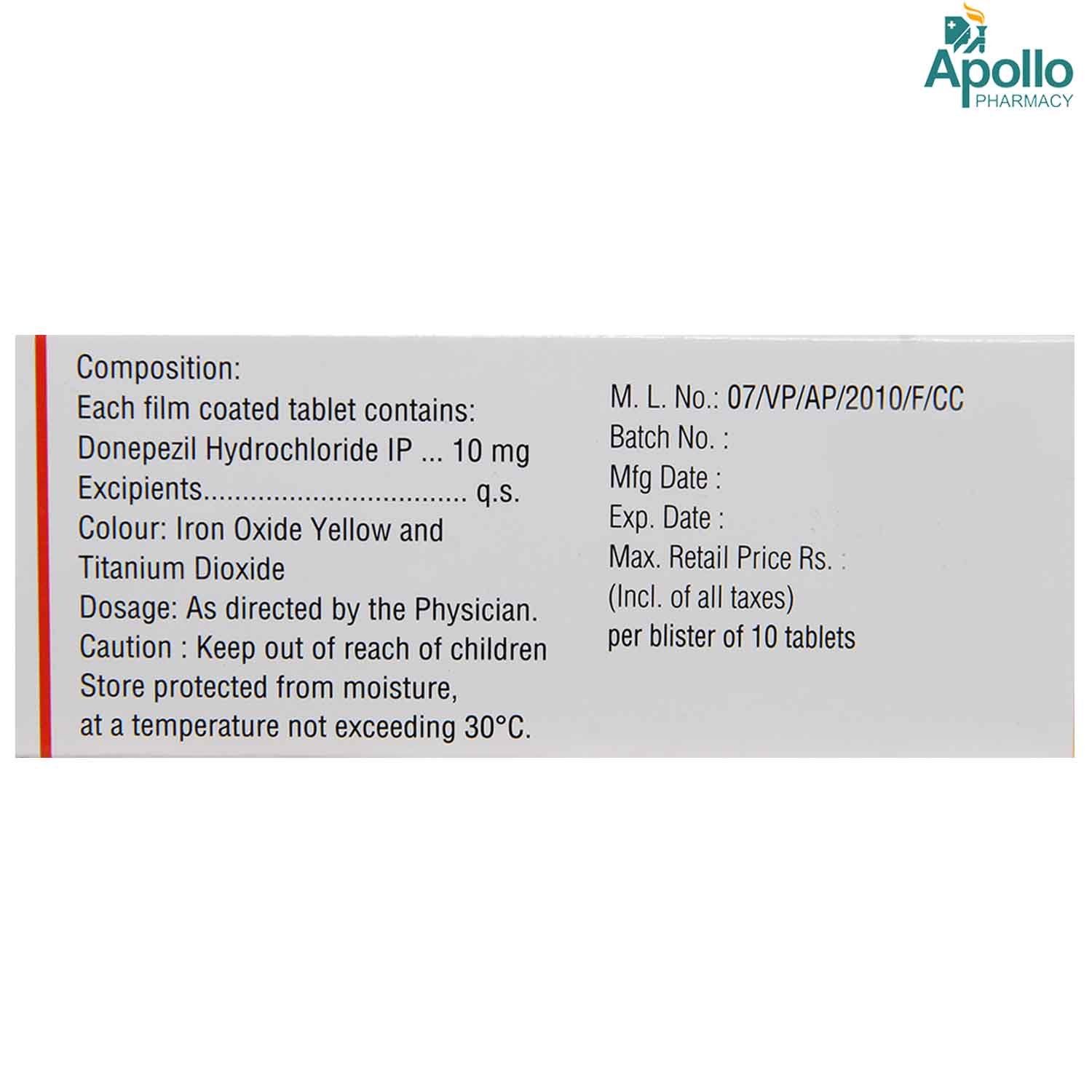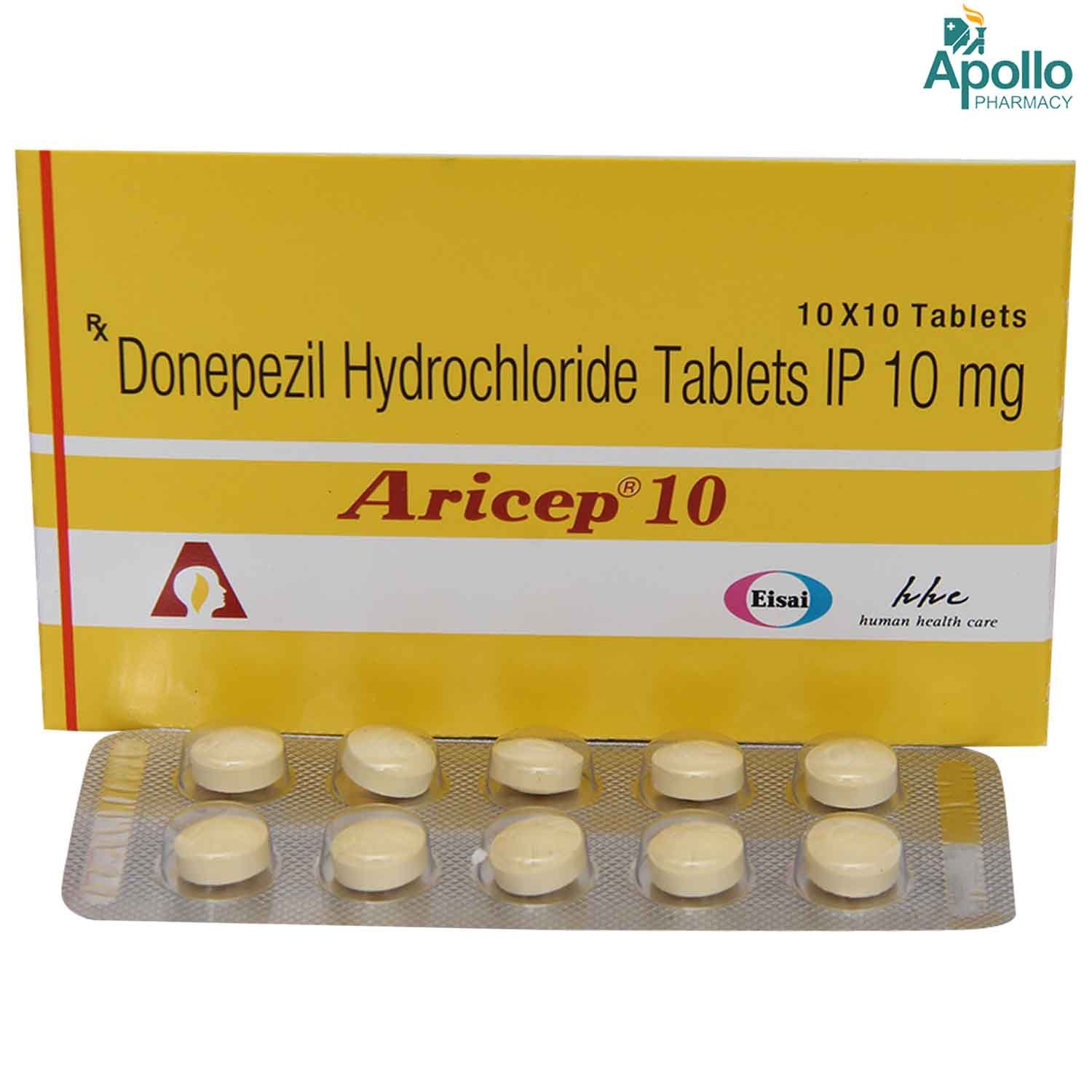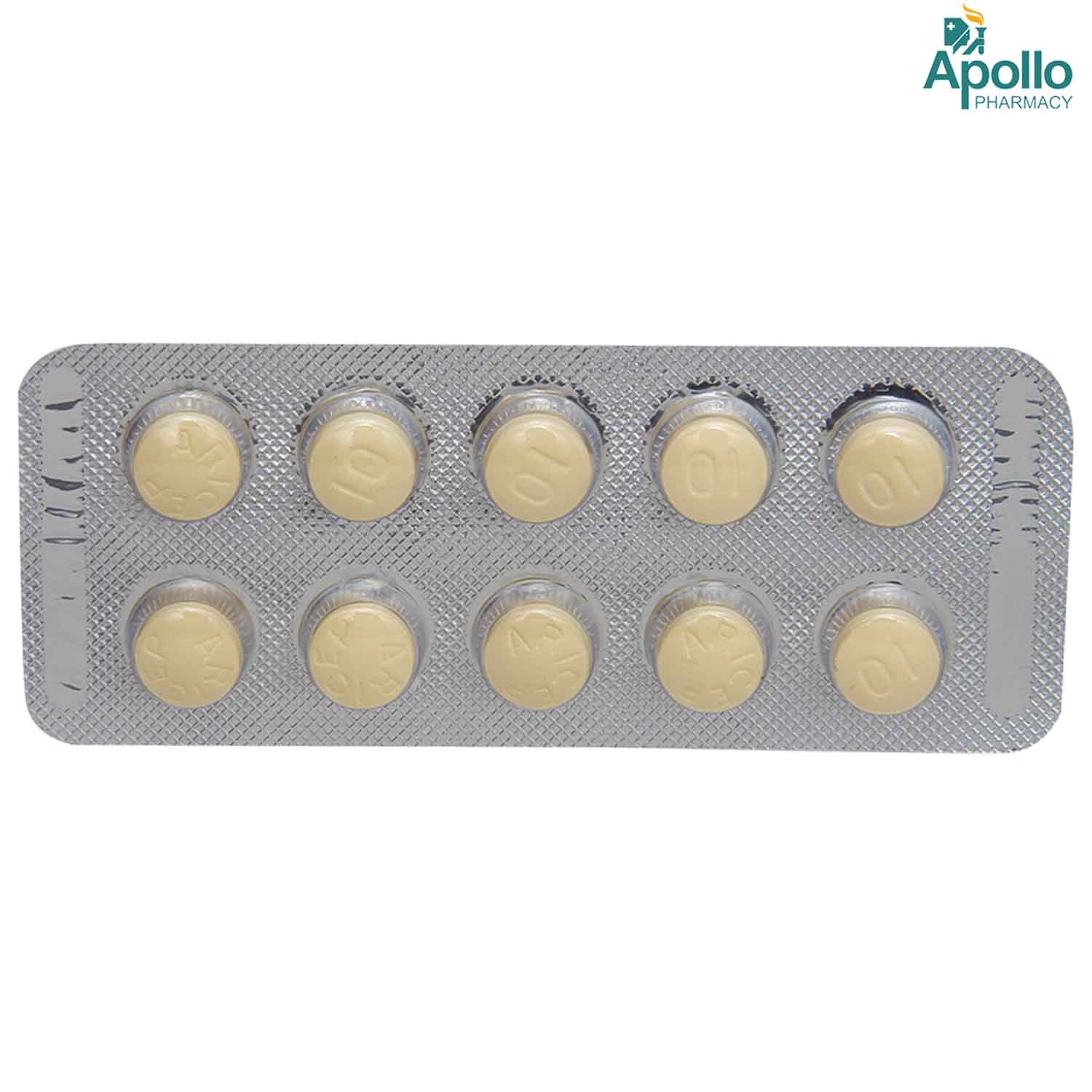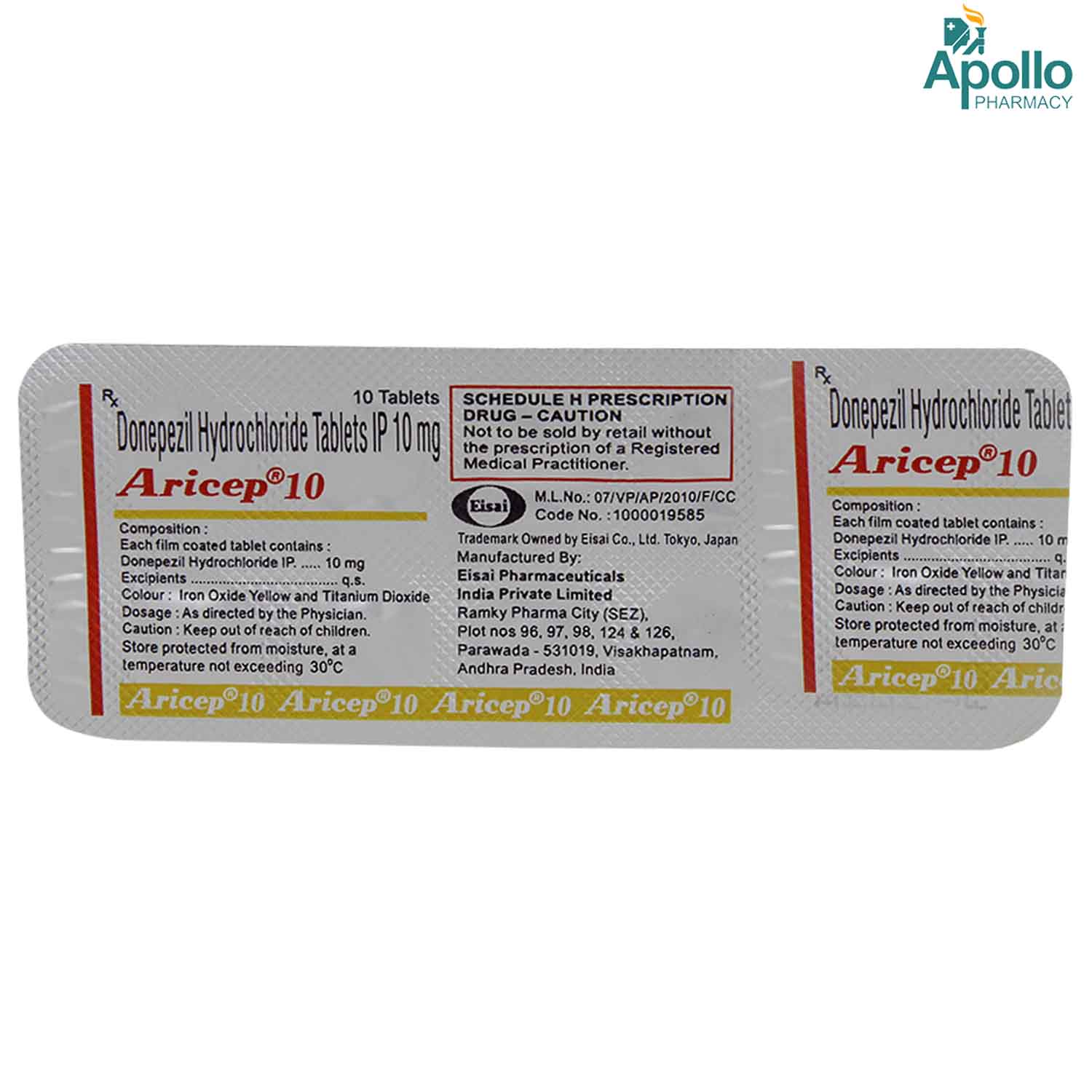Aricep 10 Tablet 10's
MRP ₹182.5
(Inclusive of all Taxes)
₹27.4 Cashback (15%)
Provide Delivery Location
Online payment accepted
 Prescription drug
Prescription drugWhats That
Composition :
Manufacturer/Marketer :
Consume Type :
Expires on or after :
Return Policy :
NPPA :
About Aricep 10 Tablet
Aricep 10 Tablet belongs to the group of medicines called 'anti-Alzheimer's drug', primarily indicated in the treatment of dementia of the Alzheimer’s disease. In Alzheimer's disease, the brain cells degenerate and die, which causes a gradual decline in behavioural and social skills and thinking ability (dementia), which affects a person's ability to function independently. The signs include confusion, increasing memory loss, and behavioural changes.
Aricep 10 Tablet contains Donepezil that falls in the category of drugs called acetylcholinesterase inhibitors. This drug increases the levels of a substance (acetylcholine) in the brain, which is involved in improving memory functioning by slowing down the breakdown of acetylcholine (a substance that allows nerves to communicate and important for normal brain functioning).
Take Aricep 10 Tablet as prescribed. Your doctor will recommend you how often you take Aricep 10 Tablet based on your medical condition. A person taking Aricep 10 Tablet may experience some undesirable effects of this medicine like insomnia, diarrhoea, muscle cramps, vomiting, fatigue, weight loss, and nausea. This happens because the body is adjusting to the new medicine. If a person notices severe side effects of medicine like dizziness, constipation, drowsiness, fainting, frequent urination, headache, joint pain, mental depression, and pain, or if side effects do not go within a couple of days, then they need to consult with the doctor immediately.
A person cannot take Aricep 10 Tablet if they are hypersensitive to any of the components present in this medicine. A person facing medical conditions like a heart rhythm disorder, a stomach ulcer, urination problems, asthma or other breathing disorder, seizure, and liver or kidney disease need to tell their doctor before taking this medicine. A woman who is pregnant or breastfeeding needs to tell their doctor before taking this medicine. This medicine should be prescribed with caution in patients having a history of asthma or obstructive pulmonary disease.
Uses of Aricep 10 Tablet
Directions for Use
Key Benefits
Aricep 10 Tablet belongs to the category of the acetylcholinesterase inhibitors, prescribed for treating the symptoms of dementia in persons having mild and moderately severe Alzheimer's disease. Aricep 10 Tablet works by helping the nerve cells communicate with each other by increasing acetylcholine levels in the brain. It stops the breakdown of acetylcholine in the brain, which is an important substance that is responsible for nerve communication. By doing so it helps a person to live a normal life.
Storage
- Inform Your Doctor: Notify your doctor immediately about your diarrhoea symptoms. This allows them to adjust your medication or provide guidance on managing side effects.
- Stay Hydrated: Drink plenty of fluids to replace lost water and electrolytes. Choose water, clear broth, and electrolyte-rich drinks. Avoid carbonated or caffeinated beverages to effectively rehydrate your body.
- Follow a Bland Diet: Eat easy-to-digest foods to help firm up your stool and settle your stomach. Try incorporating bananas, rice, applesauce, toast, plain crackers, and boiled vegetables into your diet.
- Avoid Trigger Foods: Steer clear of foods that can worsen diarrhoea, such as spicy, fatty, or greasy foods, high-fibre foods, and dairy products (especially if you're lactose intolerant).
- Practice Good Hygiene: Maintain good hygiene to prevent the spread of infection. To stay healthy, wash your hands frequently, clean and disinfect surfaces regularly, and avoid exchanging personal belongings with others.
- Take Anti-Diarrheal Medications: If your doctor advises, anti-diarrheal medications such as loperamide might help manage diarrhoea symptoms. Always follow your doctor's directions.
- Keep track of your diarrhoea symptoms. If they don't get better or worse or are accompanied by severe stomach pain, blood, or dehydration signs (like extreme thirst or dark urine), seek medical help.
- Inform your doctor about the nausea and discuss possible alternatives to the medication or adjustments to the dosage.
- Divide your daily food intake into smaller, more frequent meals to reduce nausea.
- Opt for bland, easily digestible foods like crackers, toast, plain rice, bananas, and applesauce.
- Avoid certain foods that can trigger nausea, such as fatty, greasy, spicy, and smelly foods.
- Drink plenty of fluids, such as water, clear broth, or electrolyte-rich beverages like coconut water or sports drinks.
- Use ginger (tea, ale, or candies) to help relieve nausea.
- Get adequate rest and also avoid strenuous activities that can worsen nausea.
- Talk to your doctor about taking anti-nausea medication if your nausea is severe.
- Record when your nausea occurs, what triggers it, and what provides relief to help you identify patterns and manage your symptoms more effectively.
- Hydrate your body: Drink enough water to prevent dehydration and headaches.
- Calm Your Mind: Deep breathing and meditation can help you relax and relieve stress.
- Rest and Recharge: Sleep for 7-8 hours to reduce headache triggers.
- Take rest: lie down in a quiet, dark environment.
- Cold or warm compresses can help reduce tension.
- Stay Upright: Maintain good posture to keep symptoms from getting worse.
- To treat headaches naturally, try acupuncture or massage therapy.
- Over-the-counter pain relievers include acetaminophen and ibuprofen.
- Prescription Assistance: Speak with your doctor about more substantial drug alternatives.
- Severe Headaches: Seek emergency medical assistance for sudden, severe headaches.
- Frequent Headaches: If you get reoccurring headaches, consult your doctor.
- Headaches with Symptoms: Seek medical attention if your headaches include fever, disorientation, or weakness.
- Preventing Vomiting (Before it Happens)
- Take medication exactly as prescribed by your doctor. This can help minimize side effects, including vomiting.
- Having a small meal before taking your medication can help reduce nausea and vomiting.
- Talk to your doctor about taking anti-nausea medication along with your prescribed medication.
- Managing Vomiting (If it Happens)
- Try taking ginger in the form of tea, ale, or candy to help alleviate nausea and vomiting.
- What to Do if Vomiting Persists
- Consult your doctor if vomiting continues or worsens, consult the doctor for guidance on adjusting your medication or additional treatment.
- Drink water or other clear fluids.
- To prevent worsening of pain, limit intake of tea, coffee, or alcohol.
- Include bland foods like rice, toast, crackers, and rice in your diet.
- Avoid lying down immediately after eating as it may cause indigestion or heartburn.
- Avoid acidic and spicy food as it may cause indigestion.
- Discuss with your doctor the use of medications like antidiarrheals, laxatives, or stool bulking agents to control bowel movements.
- Drink enough water to help loosen stool and ease bowel movements.
- Consume foods high in fiber to encourage regular bowel movements and avoid constipation, such as spinach, bananas, berries, and brown rice.
- Regular exercises improve bowel functionality and a healthy condition altogether.
- Do Kegel exercises to strengthen pelvic floor muscles and bowel control.
Drug Warnings
A person should tell their doctor if they are taking any prescription or herbal medicine as certain medicines may weaken or strengthen the effects of Aricep 10 Tablet . A person should avoid the consumption of alcohol as it may reduce the effects of medication. A woman who is pregnant or breast-feeding should ask their doctor for advice before taking this medicine. Alzheimer’s disease may affect the ability to drive so a person must not perform any activity that needs mental alertness unless your doctor tells you that it is safe to do so.
Drug-Drug Interactions
Drug-Drug Interactions
Login/Sign Up
Co-administration of Iomeprol and Aricep 10 Tablet can increase the risk of developing seizures. The risk increases in patients with a history of seizure or head injury.
How to manage the interaction:
Co-administration of Aricep 10 Tablet with Iomeprol can possibly result in an interaction, but it can be taken if your doctor has advised it. Contact your doctor if you experience any symptoms like shortness of breath, irregular heart rhythms, or problems with movement and memory. Do not discontinue any medications without first consulting your doctor.
Taking bupropion with Aricep 10 Tablet may increase the levels of Aricep 10 Tablet and the risk of developing seizures.
How to manage the interaction:
Co-administration of bupropion along with Aricep 10 Tablet can lead to an interaction, but it can be taken when recommended by a doctor. However, if you experience sudden dizziness, shortness of breath, or rapid heartbeat, contact your doctor immediately. Do not discontinue any medications without first consulting your doctor.
Coadministration of Iohexol and Aricep 10 Tablet can increase the risk of developing seizures. The risk increases in patients with a history of seizure or head injury.
How to manage the interaction:
Although taking Aricep 10 Tablet and Iohexol together can cause an interaction, it can be taken if your doctor has suggested it. Do not stop using any medications without first talking to your doctor.
The combined use of metrizamide and Aricep 10 Tablet can increase the risk of developing seizures. If you have a history of seizures or a head injury, contact your doctor immediately.
How to manage the interaction:
Although there is a possible interaction between Aricep 10 Tablet and Metrizamide, you can take these medicines together if prescribed by your doctor. Do not stop using any medications without first talking to your doctor.
Coadministration of Cyclopentolate with Aricep 10 Tablet can reduce the levels and effects of Cyclopentolate.
How to manage the interaction:
There may be a possibility of interaction between Cyclopentolate and Aricep 10 Tablet, but it can be taken when prescribed by a doctor. However, if you experience any symptoms like sudden dizziness, shortness of breath, or rapid heartbeat consult your doctor immediately. Do not stop using any medications without talking to your doctor.
The combined use of iopamidol and Aricep 10 Tablet can increase the risk of developing seizures. The risk increases in patients with a history of seizures or head injury.
How to manage the interaction:
Taking Aricep 10 Tablet with Iopamidol together can possibly result in an interaction, but it can be taken if your doctor has advised it. Contact your doctor if you experience any symptoms like shortness of breath, irregular heart rhythms, or problems with movement and memory. Do not stop using any medications without a doctor's advice.
Coadministration of Aricep 10 Tablet with tramadol can increase the risk of developing seizures. The risk increases in patients with a history of seizure or head injury.
How to manage the interaction:
Taking Aricep 10 Tablet with tramadol together can possibly result in an interaction, but it can be taken if your doctor has advised it. However, if you experience any symptoms such as confusion, increased heart rate, blurred vision, stomach cramps, nausea, vomiting, and diarrhea, contact a doctor immediately. Do not discontinue any medications without consulting a doctor.
Drug-Food Interactions
Drug-Food Interactions
Login/Sign Up
Diet & Lifestyle Advise
- A person dealing with Alzheimer's disease needs to take proper nutrition to make their body strong and healthy. For a patient dealing with dementia, poor nutrition can affect behavioral symptoms and may cause weight loss.
- Consume more whole grains, low-fat dairy products, vegetables, fruits, and lean protein foods, and cut down high saturated fat, refined sugars, and cholesterol from your diet.
- Patients dealing with dementia should do meditation activities that help calm down their minds and make medicine work more efficiently.
- Do physical exercises that are safe for Alzheimer/ dementia patients.
Side Effects of Aricep 10 Tablet
- Diarrhoea
- Loss of appetite
- Muscle cramps
- Nausea
- Trouble in sleeping
- Unusual tiredness
- Weakness
- Vomiting
Habit Forming
Therapeutic Class
All Substitutes & Brand Comparisons
RX
Donect 10 mg Tablet 10's
Tripada Healthcare Pvt Ltd
₹103
(₹9.27 per unit)
43% CHEAPERRX
Out of StockAlzidoc 10mg Tablet
Lupin Ltd
₹129.81
(₹11.68 per unit)
28% CHEAPERRX
Out of StockAlmERzil-10mg Tablet 10's
East West Pharma India Pvt Ltd
₹131
(₹11.79 per unit)
28% CHEAPER
Drug-Diseases Interactions
Drug-Diseases Interactions
Login/Sign Up
FAQs
Drug-Drug Interactions Checker List
- IBUPROFEN
- NAPROXEN
- DIPHENHYDRAMINE
- APIXABAN
- TOLTERODINE
- FLUOXETINE
Special Advise
Certain Cognitive and neuropsychological tests are done to diagnose dementia.
Disease/Condition Glossary
Alzheimer's disease: It is a chronic progressive disease in which the brain cells degenerate and die and is the most common cause of dementia. Dementia affects a person's ability to function independently and affects a person's thinking, judgment, behaviour, and memory. Persons dealing with this disease face symptoms like memory loss that affects daily activities, difficulty in doing familiar tasks and problem-solving, trouble in speech or writing, decreased judgment /personal hygiene, and personality changes.

Have a query?
Alcohol
Safe if prescribed
You are recommended to avoid alcohol consumption while taking Aricep 10 Tablet . Alcohol intake, along with Aricep 10 Tablet , can worsen the symptoms of dementia.
Pregnancy
Consult your doctor
Aricep 10 Tablet can only be used in pregnancy only if the potential benefit justifies the potential risk to the unborn baby.
Breast Feeding
Consult your doctor
It is not known if Aricep 10 Tablet passes into breast milk or not. Breast-feeding women should ask their doctor before using this medication.
Driving
Safe if prescribed
Aricep 10 Tablet can cause an undesirable reaction in the body that can impair a person's thinking ability. One should avoid driving and do activities that require mental alertness.
Liver
Consult your doctor
Take Aricep 10 Tablet only after the doctor's prescription, especially if you are dealing with Liver diseases/conditions as your doctor may adjust the dose as required.
Kidney
Consult your doctor
Take Aricep 10 Tablet after the recommendation of a doctor, especially if you have a history of Kidney diseases/conditions. The dosing strength needs to be adjusted by your doctor as required.
Children
Safe if prescribed
Aricep 10 Tablet has not been approved to use in children.
Recommended for a 30-day course: 3 Strips

